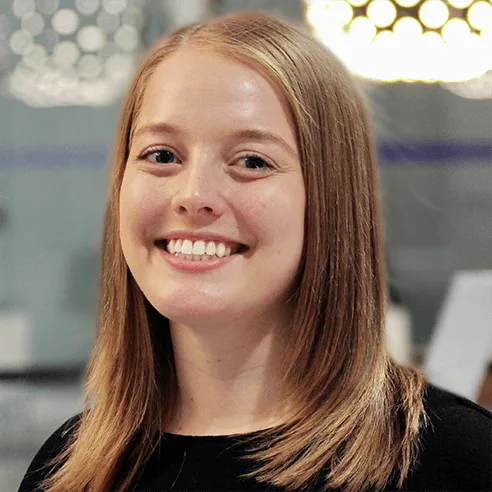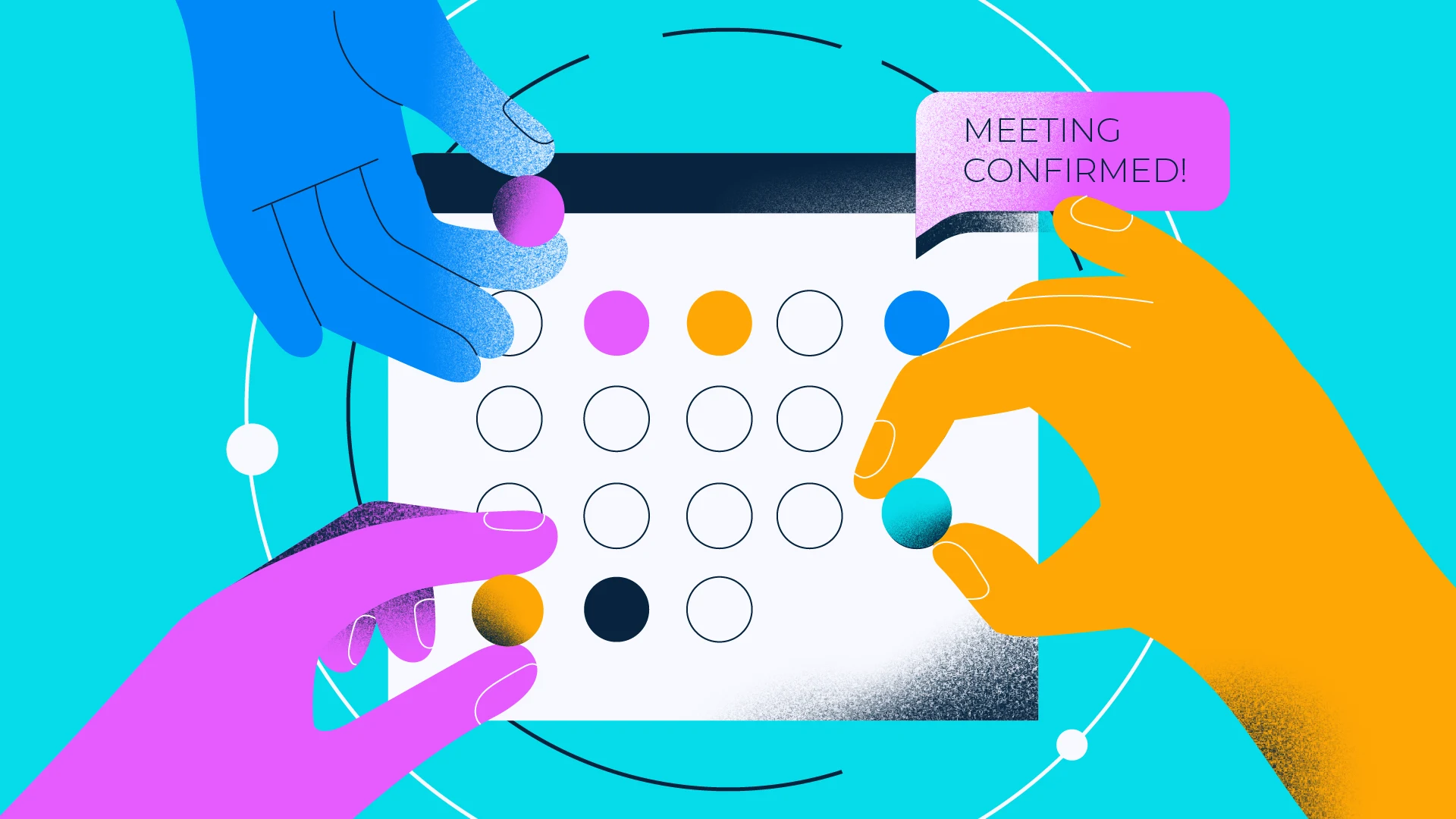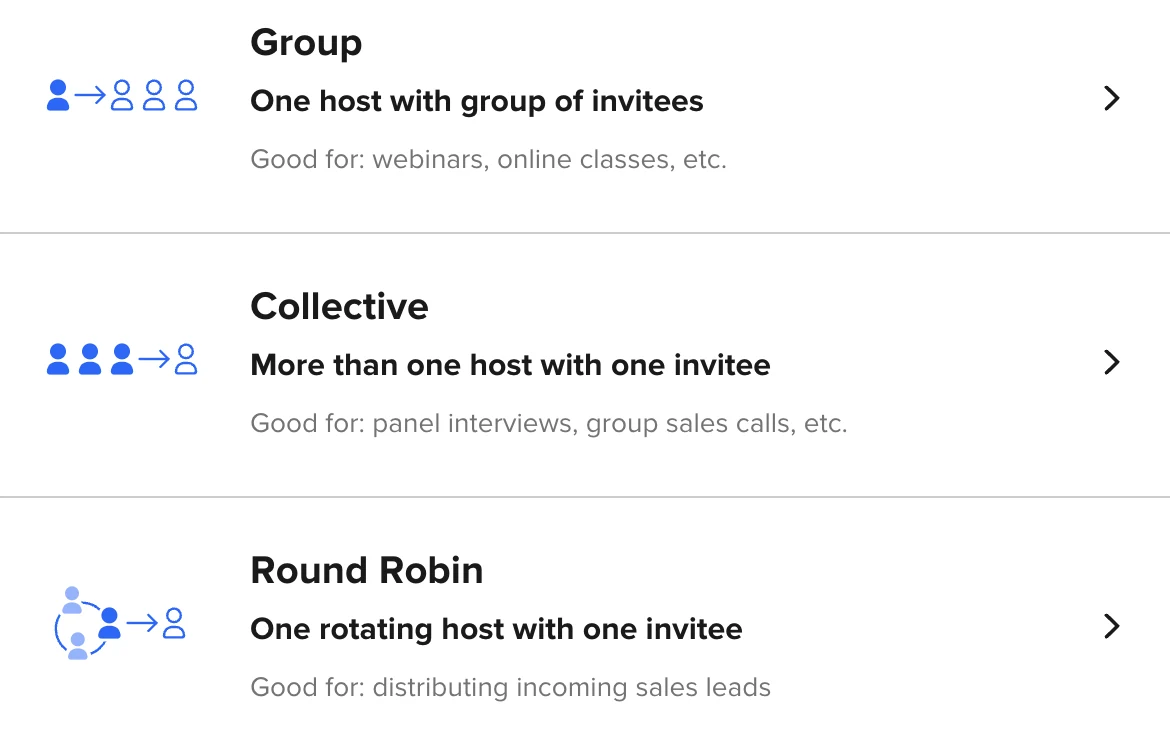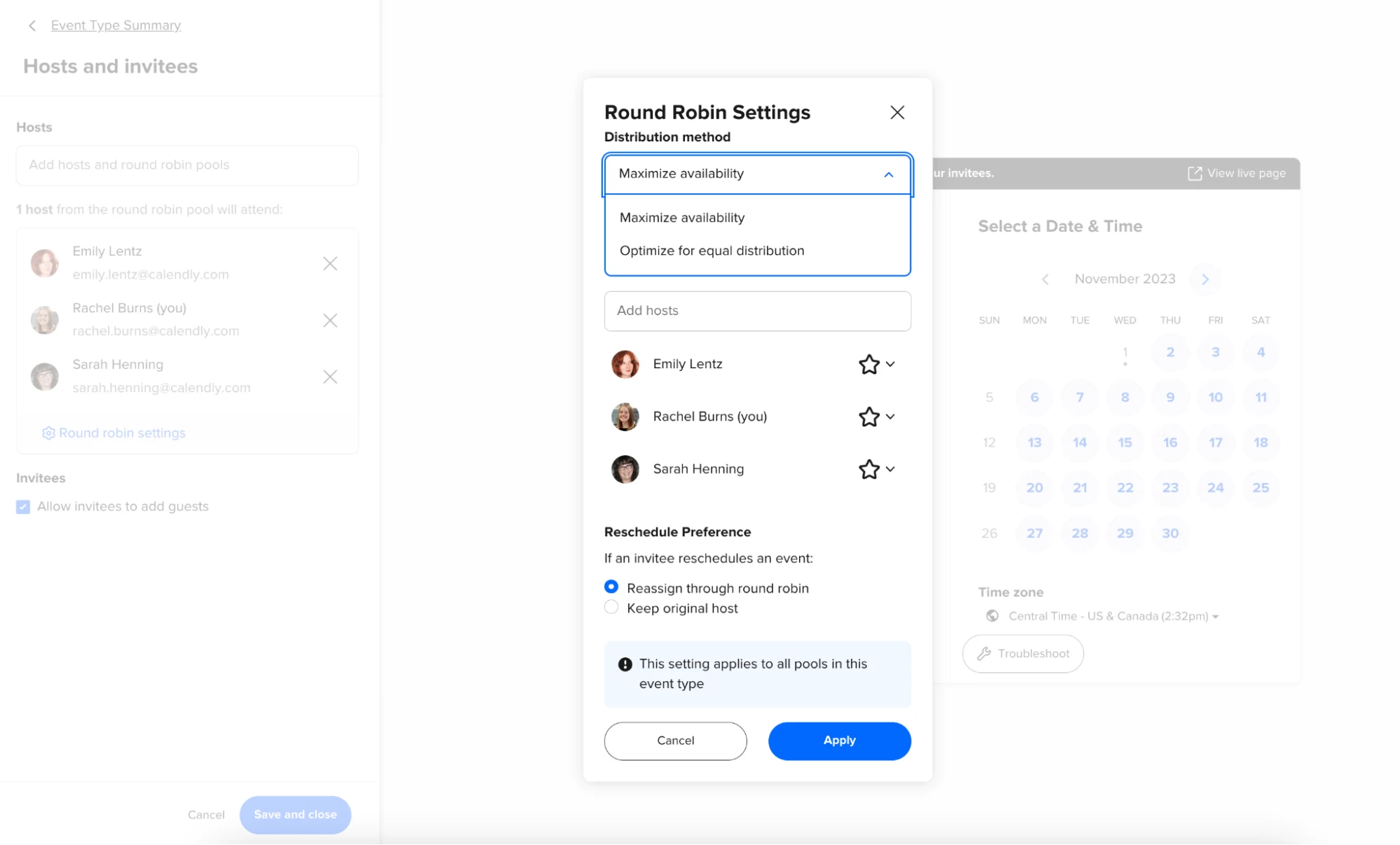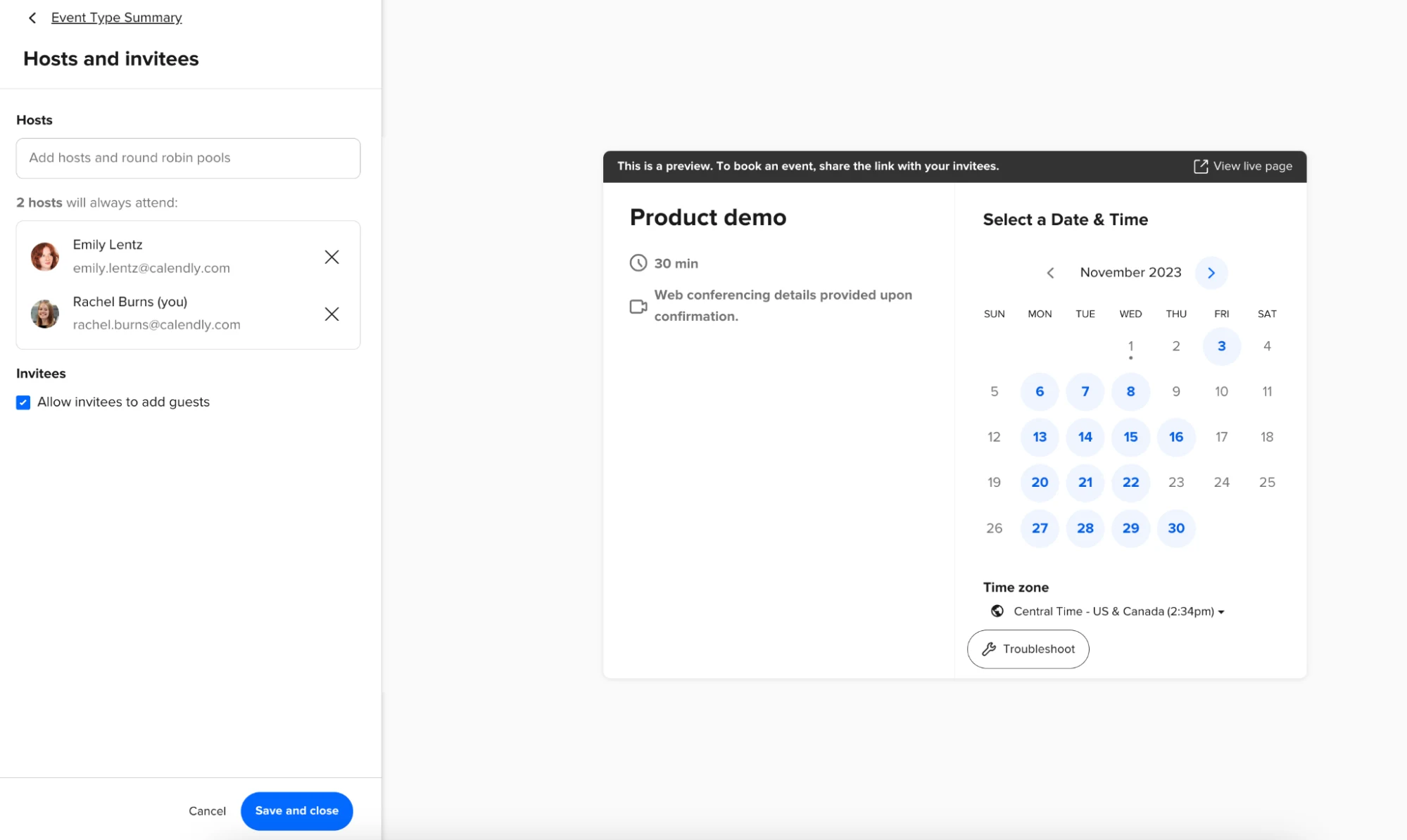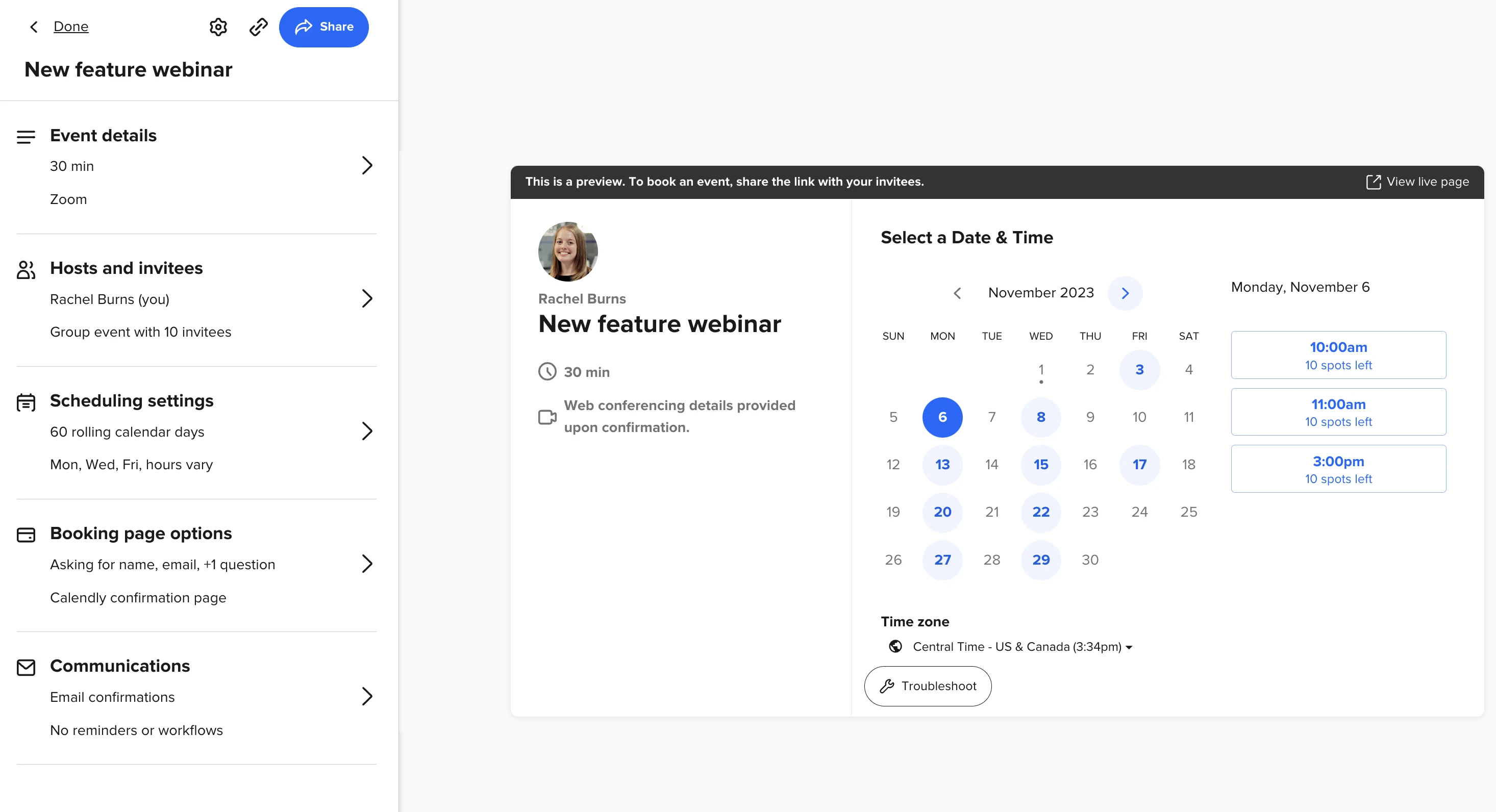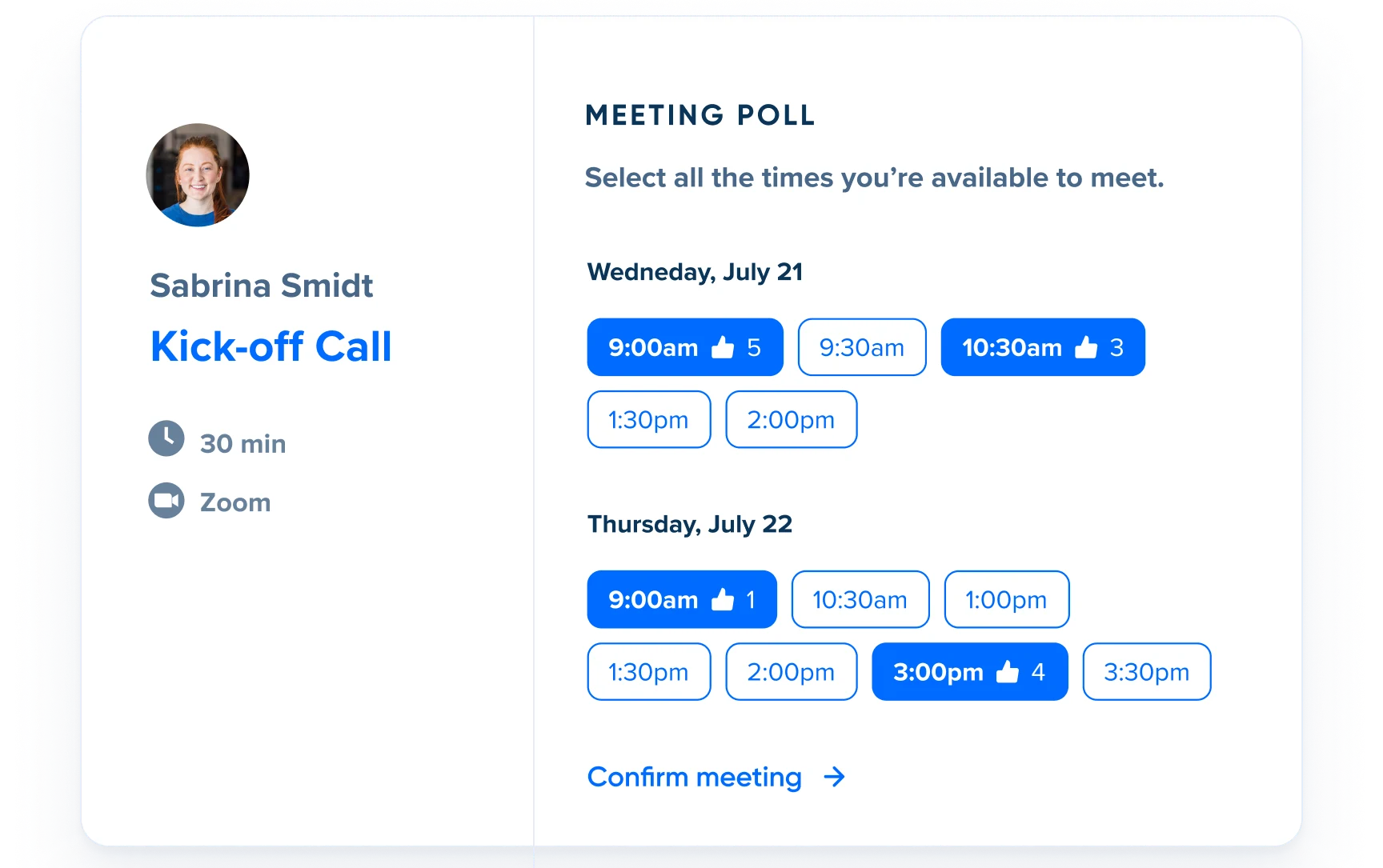Table of contents
Business growth requires meetings — and lots of them. But aligning everyone's schedules to find a time to meet can be complicated and time-consuming.
Calendly’s team scheduling features bring teams together for more productive, collaborative meetings and fewer scheduling headaches. The Round Robin, Collective, and Group Event Types help make sure everyone who needs to be in a meeting is there, at a time that works for everyone involved.
Team scheduling with Calendly makes it easy to bring together ...
Sales, marketing, and customer success collaborating on a deal
Recruiting, HR, and hiring panels interviewing candidates to fill roles
Customer support, IT, and engineering teams resolving customer issues
Higher education admissions and enrollment teams organizing tours
… just to name a few!
To learn more about Calendly’s team scheduling features, let’s walk through how revenue teams use each team scheduling option to take a deal from prospect to onboarded customer.
Round Robin: Distribute meetings across your team
Let’s start with a prospect. They’ve done their research and are ready to speak to a sales rep to get more information about your product, so they fill out a “Contact us” form on your website.
With Calendly, you can book meetings with prospects on the spot. After the prospect fills out your contact form, you send them right to your sales team’s scheduling page. They book the meeting time that works best for them, and the Round Robin Event Type automatically pairs them with the next available sales rep as soon as that same day (quicker than your competitors!). Everyone wins — your prospect doesn’t have to wait around or go through a lengthy email back-and-forth to get a meeting schedule, and your team can talk to a prospect at the peak of their interest to speed up your sales cycle.
How do Round Robin meetings work?
Round Robin scheduling automatically distributes new meetings to team members, saving you the time of manually assigning them.
You choose which team members the Event Type can be assigned to. Calendly looks at the availability of every team member and assigns the meeting to a rotating host based on customizable event logic. Optimize for:
Availability: Assign the meeting to the next available person to reduce wait times.
Priorities: When more than one person is available, you can prioritize which team member will take the meeting.
Equal distribution: Spread meetings evenly among team members to avoid overloading one person.
Need more flexibility for team scheduling? You can add hosts who will always attend the meeting alongside Round Robin assignees. For example, easily schedule a follow up with your prospect by adding two hosts: (1) the prospect’s assigned sales rep and (2) the next available member of your solutions team. Easily get the right combination of teammates together for implementation calls, renewal conversations, and more.
Learn more about setting up Round Robin meetings in this help center article.
Availability: Round Robin Event Types are available on the Teams plan and above.
Hot tip
What if someone fills out your form but isn’t a great fit? Use Calendly Routing to prevent your sales team from wasting time on unqualified leads. Instead of sending prospects to a booking page, you can show them a custom message with next steps, ask for more information, or redirect them to a specific URL.
Collective meetings: Co-host a meeting at a time that works for everyone
Back to our sales cycle example:
During the initial sales call, your sales rep learns the prospect's company is a great fit. The prospect likes what they learned and wants to see your product in action! This calls for more specific expertise, so the sales rep uses a Collective Event Type to set up a demo with the prospect, co-hosted by an account executive and sales engineer, to keep deal momentum moving forward.
Collective scheduling only shows the prospect times when both co-hosts can meet. The prospect chooses the best time for them, and Calendly adds the meeting to everyone’s calendar. The account executive and sales engineer are able to host a product demo and answer all of the prospect’s questions — all within a few days of that first sales call.
The prospect decides the solution meets their company’s needs, and is ready to make a deal! The account executive uses another Collective Event Type to set up a meeting co-hosted with the legal team to finalize the contract.
How do Collective meetings work?
When you need multiple team members to co-host a meeting, it’s time for a Collective Event Type. Collective meetings pool the availability of everyone in a group, so the invitee — in our example, the prospective customer — can only select meeting times that are open on every host’s calendar.
Need more scheduling flexibility? You can add Round Robin hosts alongside hosts that should always attend to quickly set up panel interviews and presentation reviews when hiring new team members.
Learn more about setting up Collective meetings in this help center article.
Availability: Collective Event Types are available on the Standard plan and above. For even more scheduling flexibility, consider upgrading to a Teams or Enterprise plan.
E-book: How high-performing teams achieve even more with scheduling automation
Group meetings: Your best choice for webinars and trainings
Your relationship with the customer doesn’t end once you close the deal. It’s time to start onboarding users. Your new customer has a few hundred employees to train, and as a hybrid workforce, they’re spread across time zones. Scheduling the training sessions could be a huge headache.
With Calendly’s Group Event Types, the onboarding team sets up several training sessions that multiple people can attend at the same time. The sessions are available at various times and days, so new users have plenty of opportunities to choose a time that works for their schedule.
The onboarding team also limits the number of attendees in each session, so attendees can ask questions and interact with the trainer. By the end of the first month, all employees have been onboarded to your product without interrupting their day-to-day work.
How do Group meetings work?
Calendly's Group Event Types let multiple people sign up to meet with you at once. They give you the flexibility to offer multiple meeting time options, so people can get the information they need at a time that fits their schedule.
Aside from sales use cases, use group events to schedule:
Webinars hosted by marketing teams
Q&A sessions hosted by customer success teams
Virtual job fairs hosted by recruiting teams
Group Event Types also make it easier to run effective, engaging meetings. When a meeting gets overcrowded, it can be hard to answer everyone's questions. Group meetings let you limit the number of people who can attend each session, so everyone has a chance to interact with the host. There's also no need to manage each session's availability manually. Each Group meeting remains open and visible on the scheduling page until all spots are filled.
Learn more about setting up Group meetings in this help center article.
Availability: Group Event Types are available on the Standard plan and above.
Find the best time for one-off group meetings with Meeting Polls
The team scheduling options we’ve discussed so far — Round Robin, Collective, and Group events — work great for meeting types you’ll use regularly, like sales calls and demos. What if you need to schedule a one-off group meeting, like a call with multiple stakeholders or a working session with the whole team?
Calendly’s Meeting Polls feature is the easiest way to schedule one-time meetings with multiple people.
Here’s how it works:
You create your meeting details and offer times to meet.
People vote on their preferred times.
You choose the best time based on votes, and Calendly schedules the meeting for you.
Calendly automatically sends calendar invites and meeting details to everyone who voted.
You can select up to nine co-hosts and invite up to 40 people to vote on a meeting time.
“Polling is a great addition to what is already an essential scheduling app. I can coordinate with multiple colleagues to find a meeting time that works for all with just a few clicks — even with the added complexity of 17 time zones between us!”
Mike Hugh
Program Director at Top-5 Ranked Global University
Learn more about setting up Meeting Polls in this help center article.
Availability: Meeting Polls are available on all Calendly plans.
Work better together with team scheduling
It takes countless combinations of collaborators and many different types of meetings to grow your business. With Calendly’s team scheduling features, you can book the right meetings with the right people at the right times — so your team can close more deals, retain more customers, and get more done.
Try Round Robin, Collective, and Group Event Types today to see how they help your organization grow.
Get started with Calendly
Rachel Burns
Rachel is a Content Marketing Manager at Calendly. When she’s not writing, you can find her rescuing dogs, baking something, or extolling the virtue of the Oxford comma.
Related Articles
Don't leave your prospects, customers, and candidates waiting
Calendly eliminates the scheduling back and forth and helps you hit goals faster. Get started in seconds.
Calendly eliminates the scheduling back and forth and helps you hit goals faster. Get started in seconds.
